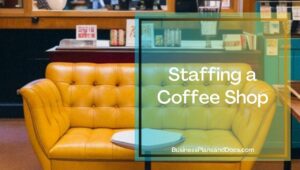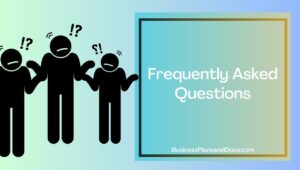Because of the nature of a coffee shop, there are several funding requirements to consider. Whether you currently own a coffee shop or are in your planning stages, understanding these needs will help set realistic financial expectations.
The average funding requirement for a coffee shop ranges between $25,000 and $250,000 for a traditional street-side business. Smaller formats, such as mobile coffee carts or espresso stands, sit in a smaller funding range of $15,000 to $25,000.
Keep reading as we explore the different areas these costs fall into, including rough estimates on specific items.
Business Formation Costs for a Coffee Shop
Before you can start funding anything else for your coffee shop, you need to legalize the start of the business. This offers you:
- Personal asset protection
- Greater credibility with new customers
- The opportunity to build (or grow) business credit
Most coffee shops benefit from establishing as a Limited Liability Company (LLC). This is a simple business structure and the formation costs and processes are minimal compared to other options, such as forming as a corporation.
Still, LLC costs vary depending on your state. If you want to reduce the headache of forming an LLC, look into the help of professionals such as ZenBusiness to handle the technical work and streamline the process.
Do You Need an Attorney For Your Accounting and Payroll Business?
Coffee Shop Location and Remodeling
The location and remodeling of a coffee shop is the most expensive part of the funding requirement, but these details can make or break the business. Renting and purchasing fees vary greatly depending on your city and state.

Location effects:
- Customer demographics
- Customer volume (and peak times)
- The products the shop sells
- Available resources
- Restocking schedule
- Monthly costs
Two identical spaces in different locations can have leasing fees that are hundreds of dollars apart. It is often worth it to choose the more expensive place because it tends to be in a location better suited to foot traffic, increasing revenue and the shop’s chances of success.
Most spaces will require remodeling to some degree, whether that is installing the necessary equipment for your coffee shop business or just revamping it to match your brand.
These costs tend to hold steady, regardless of the location you choose for your coffee shop.
A Breakdown of Renting and Build-Out Costs
While rent varies greatly depending on the location and square footage of your space, you should make sure the annual cost does not exceed 15 percent of your projected annual sales.
The cost to draft a new design and implement the new layout is often the most expensive part of your build out. Depending on the amount of work you need to do, expect to budget $5,000 to $10,000. This cost usually includes installation of equipment like sinks or countertops.
Signs will usually run you around $1,000. These include both your storefront sign and any sidewalk signs you choose to use, but both are major tools used to attract customers and let them know they’ve reached the right destination.
Furniture, such as tables, chairs, and stools, runs about $1,000 for a full set. You should expect to spend a bit more than this if you want to put a few tables outside.
A sound system for your coffee shop runs about $400 for the control and speakers, but you need another license for music streaming. Other building equipment to consider includes a mop sink ($400), a dishwasher ($700), and a sanitizer ($700).
What Types of Loans Are Available for Your Payroll and Accounting Business (And How To Find Them)
Coffee Shop Equipment
Most coffee shops will not survive off drip coffee alone, and you will need a variety of flavors and specialties to stay afloat.
Operational equipment costs include:
- Coffee: about $7.50 per pound for shop use; varies depending on which markets are available to your location
- Milk: runs upwards of $3 per gallon; need nonfat and whole milk, as well as more expensive alternatives like almond and soy
- Syrups and sugars: most flavored syrups are about $4.50 per 25.4 fl. oz. bottle; sugar packets can be bought in bulk for $75
- Water filtration: essential for brewing, especially expresso; a good quality system runs around $700
- Espresso machines: your largest equipment cost at about $15,000; look for a high-quality, semi-automatic machine to get the most out of your investment
- Espresso grinders: purchase one for regular and one for decaf; depending on brand, you can spend $1,500 to $3,000
- Espresso accessories: including tamper, pitchers, knock box, and scales; expect to spend $200; cleaning supplies run another $50
- Drip coffee makers, airpots, and accessories: you should spend around $1,500 for quality drip machines, a minimum of two airpots, and any other accessories
- Drip coffee grinder: essential for fresh brews and selling your own coffee; run about $1,000
- Refrigerators: you can operate with one, but most coffee shops have one under the counter and one in the back; expect to spend around $1,500 for both
- Pastries: funding needs vary depending on the pastries and preparation; can cost around $1,200 in a month
- Pitcher rinser: not necessary, but helpful with high traffic; a standard rinser costs around $300
You also need a POS system to process card transactions and calculate the costs of your products. Many POS systems now use tablets, and you only need to worry about the cost for the card reader and the software subscription.
How Much Insurance Do You Need For Your Accounting and Payroll Business?
Staffing a Coffee Shop

Unless you plan on cloning yourself to run the shop, you need to hire managers and baristas to keep everything running smoothly.
Most baristas are hirable at minimum wage, excluding any tips they make. This number varies depending on location, as well as the wage culture of the area. Many businesses offer competitive wages, and you should take this into consideration when hiring.
General managers for your coffee shop will handle business when you cannot, and they usually work off a salary wage starting at $35,000.
You can recruit professional assistance to get your business off the ground or maintain your finances. A lawyer can help you get established correctly, but those consulting costs run around $500.
An accountant will help you handle finances, and they charge anywhere from $150 to $400 per hour of work. They also get more work done in one hour than you might in one day.
Bookkeepers help you maintain these records, and they charge $30 to $40 per hour.
Licensing, Permits, and Insurance for a Coffee Shop
Your licensing, permits, and insurance requirements differ depending on your location. Check with your state and local government for a definitive list, but most want a:
- Business license: $50 to register, and $25 to $7,000 for the actual license; consider renewal fees in future funding requirements
- Food service license: $100 to $1,000; issued by your local health department; varies depending on the type of food you offer and the number of employees you have
- Music license: necessary to stream DMCA music; about $250 to $500 annually
- Sign permit: $20 to $50 annually; need to file application with local government first
- Certificate of occupancy: $100; confirms building is safe to occupy
- Building health permit: $50 to $1,000; focuses on sanitation; requires routine inspections
Your insurance requirements vary depending on your location. For example, $1 million in general liability can cost $500 to $12,000 per year. You should also look into any workers compensation of commercial property insurance requirements in your area, or consider offering them anyway.
Coffee Shop Taxes
Your coffee shop is responsible for certain federal and state taxes.
In short, your customers will pay the sales and use tax when they do business with you, and you pass this on to your state and local government. This rate differs by location.
Your coffee shop pays:
- Gross sales tax
- Withholding taxes for your employees
- Unemployment insurance tax (depending on your state and the size of your business)
These rates differ greatly depending on the success and size of your business, and it helps to plan for the future as much as possible to minimize issues.
While taxes are the largest headache in your funding requirements, you can usually hand these off to a professional for proper management.
How to start an office space rental business.
Frequently Asked Questions
What is the lowest funding requirement for a coffee shop?

If you aren’t ready to start a full-scale coffee shop, many businesses have great success with a coffee cart or espresso stand to start. These smaller-scale models have lower overhead costs, and you can gather all the equipment and licensing for around $15,000 to $25,000.
What should a formal funding request for a business loan include?
Your formal funding request for your coffee shop should come in the form of a business plan and include: a summary of your business, a market analysis for coffee shops, the services, products, and prices you plan to offer, organization and management, marketing strategies, your funding request and financial projections.
How can you ensure the financial success of a coffee shop?
Given the current consumer culture, a coffee shop needs to have a discernible identity to ensure its financial success. On top of normal good business procedures, a coffee shop needs to fit a niche and have qualities that distinguish it from chain shops.
To learn more on how to plan your own coffee shop business click here!
Please note that the contents of this blog are for informational and entertainment purposes only and should not be construed as legal advice. Any action taken based on the information provided in this blog is solely at your own risk. Additionally, all images used in this blog are generated under the CC0 license of Creative Commons, which means they are free to use for any purpose without attribution.

About the author. A lifetime of Entrepreneurship.
Hi! My name is Shawn and I am a happy individual who happens to be an entrepreneur. I have owned several types of businesses in my life from a coffee shop (link here http://archives.starbulletin.com/2003/05/18/business/index.html) to an import and export business to an online review business plus a few more and now I create online resources for those interested in starting new ventures. It’s demanding work but I love it. I do it for those passionate about their business and their goals. That’s why when I meet new business owner, I see myself. I know how hard the struggle is to obtain and retain clients, finding good employees and making sure everything works together all while trying to stay competitive.

